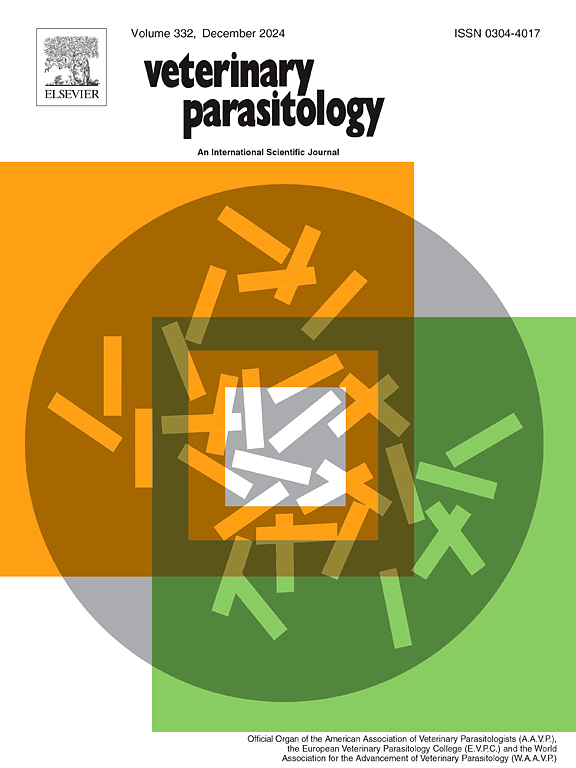炎性小体在牛磺酸和牛宿主中由微头蜱感染引发的先天免疫反应中的作用。
IF 2.2
2区 农林科学
Q2 PARASITOLOGY
引用次数: 0
摘要
养牛业是巴西农业的一个重要部门,其中微型鼻头蜱的侵扰对牲畜生产力构成了重大挑战。这些虫害给生产者和工业造成直接和间接的经济损失。使用杀螨剂作为一种常用的控制方法,往往会导致蜱虫产生抗药性,从而降低了这种方法的有效性。适应性免疫反应,特别是由T细胞活化和产生特异性抗体介导的适应性免疫反应,对于保护包括牛在内的各种物种免受寄生虫感染至关重要。然而,这种反应的潜在机制,特别是炎性体的激活,在品种差异方面仍然知之甚少。这些变异可能影响适应性免疫反应,因为牛磺酸品种(Bos taurus)和牛品种(Bos indicus)表现出不同的免疫特征和对蜱虫感染的不同敏感性。本研究调查了荷斯坦牛(牛磺酸)和Gyr牛(indicine)在控制蜱虫感染前后的炎性体反应,以阐明先天免疫反应如何调节适应性免疫,从而影响蜱虫抗性。本文章由计算机程序翻译,如有差异,请以英文原文为准。
The role of inflammasomes in the innate immune response triggered by Rhipicephalus microplus tick infestation in taurine and indicine bovine hosts
Cattle farming is a crucial sector of Brazilian agriculture, in which infestations by Rhipicephalus microplus ticks pose substantial challenges to livestock productivity. These infestations cause both direct and indirect economic losses for producers and the industry. The use of acaricides, a common control method, often leads to the development of resistance in ticks, reducing the effectiveness of this approach. Adaptive immune responses, particularly those mediated by T cell activation and the production of specific antibodies, are essential for protection against parasitic infections in various species, including cattle. However, the underlying mechanisms of this response, especially inflammasome activation, remain poorly understood with respect to breed differences. These variations may influence the adaptive immune response, as taurine breeds (Bos taurus) and indicine breeds (Bos indicus) exhibit distinct immune profiles and different susceptibilities to tick infestations. This study investigated inflammasome responses in Holstein (taurine) and Gyr (indicine) cattle before and after controlled tick infestations to elucidate how innate immune responses may modulate adaptive immunity and, consequently, influence tick resistance.
求助全文
通过发布文献求助,成功后即可免费获取论文全文。
去求助
来源期刊

Veterinary parasitology
农林科学-寄生虫学
CiteScore
5.30
自引率
7.70%
发文量
126
审稿时长
36 days
期刊介绍:
The journal Veterinary Parasitology has an open access mirror journal,Veterinary Parasitology: X, sharing the same aims and scope, editorial team, submission system and rigorous peer review.
This journal is concerned with those aspects of helminthology, protozoology and entomology which are of interest to animal health investigators, veterinary practitioners and others with a special interest in parasitology. Papers of the highest quality dealing with all aspects of disease prevention, pathology, treatment, epidemiology, and control of parasites in all domesticated animals, fall within the scope of the journal. Papers of geographically limited (local) interest which are not of interest to an international audience will not be accepted. Authors who submit papers based on local data will need to indicate why their paper is relevant to a broader readership.
Parasitological studies on laboratory animals fall within the scope of the journal only if they provide a reasonably close model of a disease of domestic animals. Additionally the journal will consider papers relating to wildlife species where they may act as disease reservoirs to domestic animals, or as a zoonotic reservoir. Case studies considered to be unique or of specific interest to the journal, will also be considered on occasions at the Editors'' discretion. Papers dealing exclusively with the taxonomy of parasites do not fall within the scope of the journal.
 求助内容:
求助内容: 应助结果提醒方式:
应助结果提醒方式:


